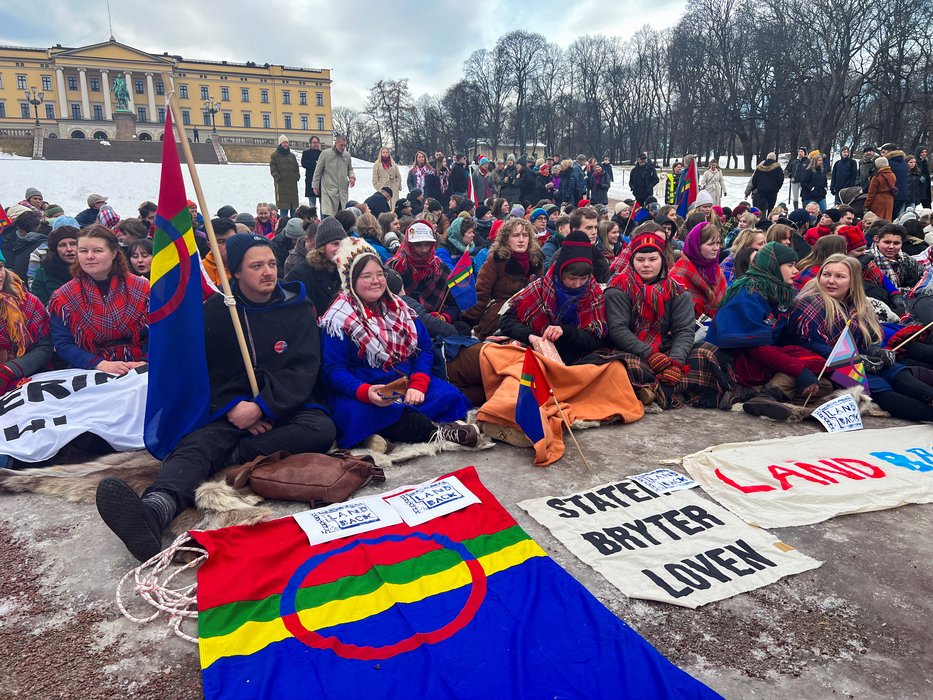
Freedom of peaceful assembly
Demonstrations in support of Ukraine receive widespread political backing
On 24th February 2023, marking the anniversary of the Russian invasion of Ukraine, hundreds of demonstrators gathered across the country to commemorate the event, display solidarity with the Ukrainian people, and call for an end to the war. In Oslo, the demonstrators convened in front of the national Parliament and passed by the Ukrainian Embassy. Politicians from various political factions expressed their support for the cause, with some actively participating in the procession, including former Prime Minister Erna Solberg and Oslo Mayor Marianne Borgen. Several other initiatives were organised around this significant date in the country, such as a support concert for Ukraine hosted by the University of Oslo and the children’s humanitarian organisation SOS Barnebyer.
Environmental and indigenous rights activists occupy Energy Ministry in support of Sami rights
In February 2023, environmental and indigenous rights activists occupied Norway’s Oil & Energy Ministry, blocking all entrances to the building in a series of actions. Their aim was to compel the Norwegian government to finally uphold a Supreme Court ruling issued in October 2021 which found that the wind turbines erected on Sami grazing lands in the Fosen area of Trøndelag violate their human rights, as it disrupts the work of reindeer herders.
The protesters took over the building on Saturday the 25th, were detained by the police on Sunday the 26th, and subsequently released. The Minister of Oil & Energy stated he had granted permission for the demonstrators to spend the weekend in the ministry building, and that the arrests were a decision made by the police authority. On Monday the 27th, protesters, including the Swedish activist Greta Thunberg, returned to the building and attempted to obstruct the entrance, securing themselves to a side door. The police once again intervened to disperse the demonstrators. On Tuesday the 28th in the afternoon, the protests expanded, and activists blocked entrances at the Finance Ministry across the street and the Agriculture Ministry around the corner. The police removed the protesters, who managed to regroup after being released. Many media outlets criticised the government's use of force to disperse the protest.
Despite the Supreme Court’s ruling, the 151 turbines are currently still operational. The Norwegian government has contested the ruling, calling for further studies to be conducted to assess if there are more sustainable ways of operating the turbines for the indigenous people. Political parties including the Reds, the Socialist Left, and the Greens have all urged the government to apologise to the Sami for the damage the infrastructure has caused to the reindeer herds and the Sami livelihoods. An apology from the responsible Ministers finally arrived on 2nd March, when Oil & Energy Minister Terje Aasland and Agriculture Minister Sandra Borch met with representatives of the Sami, including the president of the Sami Parliament, Silje Karine Muotka. Minister Aasland conceded that the turbines are illegal and that the government took too long to comply with the Supreme Court’s ruling. He still expressed hope that the turbines and the Sami's reindeer can coexist, but acknowledged that the government is prepared to dismantle the windmills if this is the only viable solution. Consequently, the protesters concluded their series of actions in front of the Royal Palace during the weekly cabinet meeting. A rally of Sami people dressed in traditional attire was also held on the same day. General satisfaction was expressed by the protesters, including Silje Karine Muotka, while others called for a more comprehensive apology that recognises the violation of human rights and is issued on behalf of the entire government.
Workers protest cuts in healthcare budget
In early March 2023, nurses gathered in front of the Norwegian Parliament to protest against budget reductions in the healthcare sector and nursing homes, while some observers referred to a “healthcare crisis” in the country. These cuts have led to the closure of facilities, as well as a decrease in the responsiveness and adequacy of services. Healthcare workers claim to have been forced to discharge patients prematurely due to their medical conditions, solely to free up new beds, or that non-essential surgeries and procedures have been postponed due to shortages of resources. Critics of the government have also emphasised that this situation has resulted in a brain drain from the public sector. These protests follow a series of demonstrations and strikes by daycare centre personnel over working and social protection conditions, as previously reported by CIVICUS Monitor.